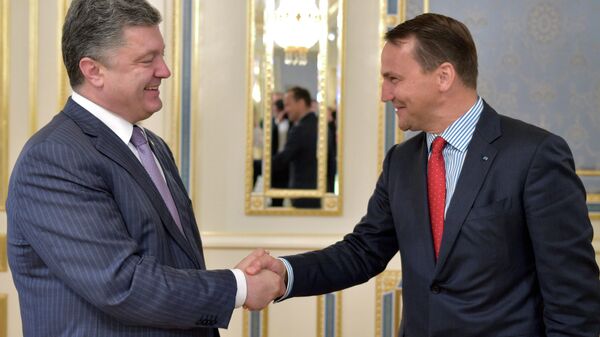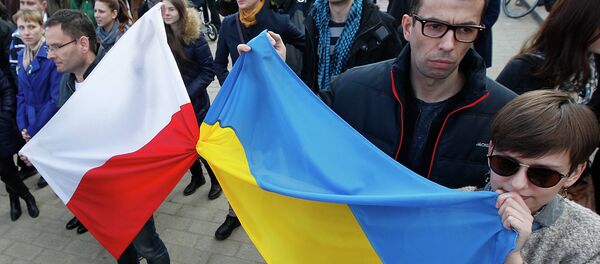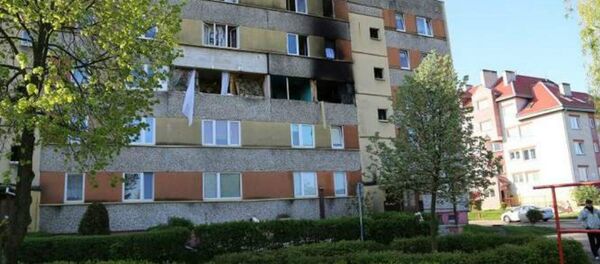Speaking to the Polish Press Agency, Sikorski confirmed that he has been asked to join the Council, headed by fugitive Georgian ex-president and current Odessa governor Mikheil Saakashvili.
"I intend to visit Ukraine regularly, because I support the country's reform," Sikorski noted, adding that he is "delighted that Ukraine will be looking to learn from the Polish experience."
Apparently, that experience includes borderline hysterical anti-Russian rhetoric backed by neoconservative ideology. Sikorski is married to Anne Applebaum, an American-Polish journalist known for her hawkish, stridently anti-Russian attitudes, who said at the height of the Ukrainian crisis in March, 2014 that the US and its allies should not allow for the continued "existence of a corrupt Russian regime that is destabilizing Europe," later adding that Europe should prepare for "total war" with Russia.
During his term as foreign minister, prior to the Ukrainian crisis, Sikorski signed the missile defense agreement with US Secretary of State Condoleezza Rice. The official was openly involved in the events leading up to and following the Maidan coup d'état in the winter of 2014. On February 24, 2014, Sikorski signed his name to what was ostensibly meant to be a compromise deal between then-President Viktor Yanukovych and the Western-supported opposition leaders amid mass protests in Kiev. Yanukovych was forced to flee the country the next day.
When anti-Maidan activists began rising in Ukraine's Donbass region, Sikorski was quick to label them "terrorists," adding that NATO and the EU should take off the "kid gloves" in their dealings with Russia and its leadership, up to and including threatening Russia militarily, if necessary.
In October 2014, Sikorski found himself in the center of a scandal in his home country when he told Politico that, in a 2008 meeting between Putin and Tusk, "he (Putin) wanted us (Poland) to become participants in [a] partition of Ukraine." He was later forced to admit that "his memory had failed" him, saying that "some of my words have been over-interpreted." It turned out that not only did Putin not make the comments, but the meeting Sikorski described had never even taken place. The scandal led to intense criticism for the minister from within his own party, with opponents saying that he should resign.
Sikorski does not appear to have lost any of his exaggerated anti-Russian zealotry. A few days ago, the politician spoke at the 12th annual Yalta European Strategy forum, organized by Ukrainian oligarch Viktor Pinchuk and aimed at promoting Ukraine's membership in the European Union via high-level talks between Ukrainian and European officials.
The politician's appearance at the forum made headlines in both Poland and Ukraine, after he suggested that NATO should stockpile weapons on Poland's border with Ukraine, in case of Russian aggression. "Anti-tank weapons can be deployed somewhere close to Ukraine, in Poland or Romania. If the pro-Russian or Russian forces move deeper into the territory of Ukraine, these weapons will be supplied to Ukraine in a very fast manner, within an hour." The politician warned that "President Putin should understand this."
In June, Sikorski was forced to resign from office as Speaker of Poland's parliament, a post he had held for less than nine months, amid a scandal involving leaked tapes from 2013 and 2014 where, among other things, he candidly explained that Poland's alliance with the United States was "bull****," adding bluntly that he feared that Poland would "get into a conflict with the Russians and the Germans, and we'll think that everything is super because we gave the Americans a ****job."
Losing the confidence of his party, Sikorski has said that he will not run in Poland's parliamentary election in October.
Sikorski's appointment to the Council puts him in good company with a long list of neoconservative hawks and virulently anti-Russian politicians advising the Ukrainian president, from former Prime Minister Bildt, to former Slovak PM Mikulas Dzurinda, former Prime Minister Tony Blair and former Lithuanian PM Andrius Kubilius, to lesser-known officials and intellectuals, including right-wing Swedish economist Anders Aslund.




